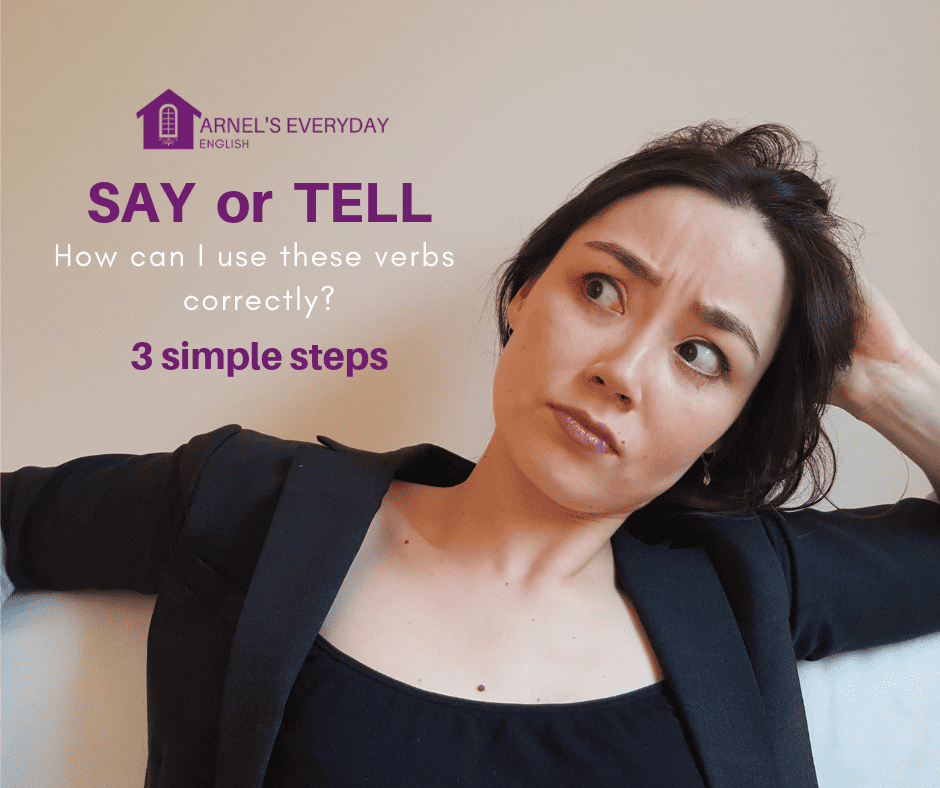Hi everyone! Today, I have a grammar lesson for you on how to correctly use the two verbs ‘say’ and ‘tell.’ These often confuse students, so I’ve structured this blog in a simple-to-follow manner. We’ll start with a definition, then explore the biggest differences between the two, dive into their grammatical structures, and finally, look at some example phrases to understand their practical applications. Let’s get started
SAY and TELL have the same definition:
we are communicating with someone
The difference is grammatical. Let’s look at the difference in 3 steps:
#1 the biggest and most important difference
#2 the grammatical structures of ‘say/tell’
#3 ‘say’ and ‘tell’ phrases
First, it’s important to remember, SAY and TELL are irregular verbs:
#1 The biggest difference
We do not use ‘say‘ with an indirect object.
✓My boss said (that) I needed to work longer hours.
My boss said me (that) I needed to work longer hours.
*’that’ is optional if it is followed by a subject + verb
✓Brenda said (that) the meeting starts at 4 PM.
Brenda said us (that) the meeting starts at 4 PM.
✓Every time I see you, you say something different.
Every time I see you, you say me something different.
We only use an indirect object with ‘tell’. We must use an indirect object.
✓My boss told me (that) I needed to work longer hours.
My boss told (that) I needed to work longer hours.
✓Brenda told us (that) the meeting starts at 4 PM.
Brenda told (that) the meeting starts at 4 PM.
✓Every time I see you, you tell me something different.
Every time I see you, you tell something different.
How do I decided whether to use ‘say’ or ‘tell’?
If you want to focus on WHO receives the communication, use ‘tell’:
Dave and I decided not to tell anyone about my pregnancy. (Who receives the communication? – everyone)
My teacher told me I needed to work on my listening skill. (Who receives the communication? – me)
I can’t believe Sandra told my boyfriend that I actually didn’t like the gift he gave me! (Who receives the communication? – my boyfriend)
When you use ‘say’, the person who receives the communication is a) obvious or b) not important.
The teacher said that we needed to hand in our homework on Thursday.
(It’s obvious that the people who receive the communication are ‘the students’.)
COMPARE:
Emma: I told Brian that I wanted a divorce. (Who receives the communication? – Brian)
Denise: Oh my goodness! What did he say? (It’s obvious Brian would say something to Emma. No object is necessary.)
#2 grammatical structures of say / tell
say + (that) + subject + verb
Maria said that Chris wasn’t feeling well.
Everyone I spoke to said that the food at the work party was excellent.
Most people would say that family is the most important thing in their lives.
say + ‘direct speech’ (in quotation ” marks)
Last night Jim said ‘I love you.’
Tina looked at me and actually said ‘Wow, you’ve gained a few pounds.’
Why do people say ‘bless you’ after you sneeze?
say + to + object …
Nancy said to me that she was thinking about quitting her job.
What did Vincent say to you in the meeting?
Last night, Gary said to everyone that he was moving to the south of France.
tell + object + (that) + subject + verb
Nancy told me that she was thinking about quitting her job.
A:What did Vincent tell you in the meeting?
B:He told me that our department might be downsizing.
Last night, Gary told everyone that he was moving to the south of France.
tell + object + to + infinitive = an imperative (a command)
Tell Iris to turn down her music!
As a doctor, I always tell my patients to reduce their sugar intake.
#3 Say/Tell phrases
‘Say’ and ‘Tell’ are often used in fixed phrases which do not follow any specific grammatical rules. You should memorise these phrases as one piece of vocabulary.
1.say a prayer
✓He says a prayer every night before bed.
He tells a prayer every night before bed.
2. say ‘cheese’
✓Okay everyone, I’m going to take a picture. Say cheese!
Okay everyone, I’m going to take a picture. Tell cheese!
3. tell (someone) a joke
My dad always tells so many jokes. Hm… not all of them are funny.
My dad told me a hilarious joke over the phone.
4. tell (someone) a lie
I think you’re telling a lie. I don’t believe you.
My ex-husband would tell me lie after lie.
5. tell (someone) the truth
Do you promise to tell the truth?
Please tell me the truth.
6. tell (someone) the future
A fortune teller charged me £50 to tell me the future.
Laura believes she can tell the future. What a load of rubbish!
7. tell (someone) the time
Excuse, could you please tell me the time?
I learnt how to tell the time when I was seven.
‘Say and Tell’ are reporting verbs. You might also like:
Thank you so much for reading. I hope you’ve found this grammar blog helpful. Please feel free to share this blog with any friends or family members you feel would find this helpful. Also, leave me some example sentences in the comments below, I love hearing from you.









